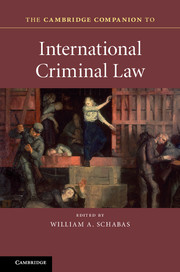Book contents
- Frontmatter
- Dedication
- Contents
- List of contributors
- List of abbreviations
- Introduction
- PART I PURPOSES AND PRINCIPLES
- 1 Human rights and international criminal law
- 2 Truth and justice in atrocity trials
- 3 Transitional justice
- 4 Punishment and sentencing
- 5 Peace
- PART II INSTITUTIONS
- PART III CRIMES
- PART IV TRIALS
- PART V THE FUTURE
- Index
- References
2 - Truth and justice in atrocity trials
from PART I - PURPOSES AND PRINCIPLES
Published online by Cambridge University Press: 05 December 2015
- Frontmatter
- Dedication
- Contents
- List of contributors
- List of abbreviations
- Introduction
- PART I PURPOSES AND PRINCIPLES
- 1 Human rights and international criminal law
- 2 Truth and justice in atrocity trials
- 3 Transitional justice
- 4 Punishment and sentencing
- 5 Peace
- PART II INSTITUTIONS
- PART III CRIMES
- PART IV TRIALS
- PART V THE FUTURE
- Index
- References
Summary
In 1997, the prominent French historian of Vichy, Henry Rousso, was asked to testify in the trial of Maurice Papon, the former French budget minister who stood accused of complicity in crimes against humanity for his actions as a police official during the Nazi occupation of France. Rousso declined the invitation. Worried that his testimony would contribute to what he called a ‘judicialisation of the past’, Rousso objected to trials in which ‘beyond the judgment of particular individuals, the declared goal is to illuminate an entire era and its politics’.
Rousso's concerns echoed those voiced thirty-five years earlier by Hannah Arendt in Eichmann in Jerusalem. In her famous ‘report on the banality of evil’, Arendt insisted, ‘the purpose of a trial is to render justice and nothing else. Even the noblest of ulterior purposes – the making of a record of the Hitler regime which would withstand the test of history – can only detract from the law's main business'. That is, rendering a just verdict.
Admittedly, the two positions are not identical. Rousso's concern seems to be what law does to history: when forced to speak in the law's Manichean idiom, the historian's voice loses nuance and subtlety, becomes somehow false. By contrast, Arendt's concern appears to be what history does to law: when burdened with the pressures of composing history, the trial wanders from the solemn dictates of justice. But taken together, the views of Rousso and Arendt can be seen as emblematic of a belief that has gained wide currency among scholars of law and history – that the interests of justice and truth are fundamentally incompatible.
That such a belief should gain such wide acceptance seems, at first blush, deeply anomalous. Critics of the criminal justice system might bemoan how imperfectly truth is served, but to suggest that truth is irrelevant to the system is nothing short of extravagant. At the most basic, the criminal trial is an instrument for ascertaining truth: it is tasked with determining the truth of charges brought against the accused. Clearly, fixing the truth is not the sole goal of trial procedure. The system is prepared, for example, to bar highly probative evidence of factual guilt if such evidence was acquired in violation of the accused's constitutional or basic rights. Truth-seeking must, then, respect the dignity and autonomy of the accused.
- Type
- Chapter
- Information
- The Cambridge Companion to International Criminal Law , pp. 34 - 51Publisher: Cambridge University PressPrint publication year: 2016
References
- 9
- Cited by

